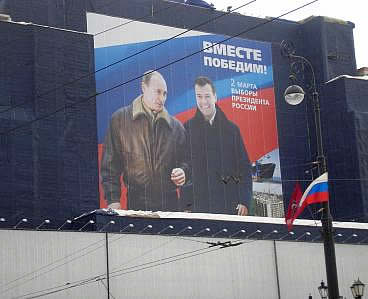SP's Senator Kox Reports from Moscow as Russia Votes
SP's Senator Kox Reports from Moscow as Russia Votes
Moscow – Saturday 1 March. On Sunday Russia elects a new President. The polling stations are not yet open but the result is already certain. The successor to President Vladimir Putin will be Vice-Premier Dmitri Medvedev. His three opponents have no shadow of a chance in a campaign which has raised a number of questions for the Council of Europe's observers. One of these is the SP's Senate leader Tiny Kox, who reports from Moscow.
The good news and the bad news
“The good news is that there are elections,” says Senator Kox. “Russia has only had a democratic system for a short time. The bad news is that this democracy and these elections still leave a great deal to be desired. According to analysts Russia is a politically immature democracy. A good fifteen years after the fall of communism there is a formal democracy, with an electoral law which in general terms conforms to the standards laid down by the Council of Europe, with an elected parliament, a government which is supported by a parliamentary majority, and an elected president. That is also what the head of the central electoral commission, Vladimir Churov, tells election observers: our rules conform. But as for real politics, there's almost no question of such. The State Duma, the Russian Parliament, has a beautiful building but little power and the President combines so many tasks and competences that he appears wellnigh omnipotent.”

From crisis to stability
It must be said that the popularity of the current president will be the most important reason why on Sunday most Russian will vote for Medvedev to be his successor. After the fall of communism the country stumbled, during the '90s, from one crisis to another, with people losing their jobs, their incomes, their savings and their faith in the future. Since Putin came to power, stability has increased and the economy has grown strongly. And Russia, that ten years ago was forced to bow down before the west, has rediscovered its self-confidence. Russia once more plays the international game, and many Russians have things better, even though very many continue to live miserably. “People are voting on Sunday over eight years of Putin, by voting for Medvedev. Putin himself will not disappear from politics, but will become Prime Minister. Whether the cooperation between Medvedev and Putin will remain as good as it now appears is impossible to predict. The new president has grown up under Putin's wing but unlike him does not have his roots in the KGB. In that he is an exception in the Russian political and economic elite who almost all have a KGB background. From tomorrow he will be the most powerful man in the country.”
Competitors have no chance
There are three candidates besides Medvedev: the extreme right candidate Zirinovsky, the Communist Party Chair Zuganov and the almost unknown Chair of the Democratic Party Bogdanov. “I've spoken to all three of them during my stay here. Zuganov is the most realistic, with a real party behind him, a party with a programme and an organisation. Zuganov knows that the most he can hope for is second place. He is using the campaign to develop resistance to Putin, to promote his party's ideas and strengthen its organisation. Zirinovsky always stands. More of a phenomenon than a representative of a party, he attracts each time a few million protest voters, with his rabid reproaches aimed at the west, foreigners, Jews and minorities. Nobody thinks that he has any serious proposals for a better Russia. Bogdanov has little to offer. He calls himself democratic, conservative, a supporter of Russian participation in NATO and the European Union – and thus renders himself completely without any chance of winning. Added together these three opponents of Putin should get around 25%, according to the polls. All three believe the campaign to have been unfair, although less so than last time, but with much too much TV attention for Medvedev, who once again also refuses to take part in TV debates. So these debates are also about second place. Medvedev says that he has to work and doesn't have the time for debating. Nonsense of course – it's a political choice. He also had no time to meet us, which is just as big a piece of nonsense. The campaign strategy is to keep away completely from any and all controversy and simply play the role of Putin's successor. It isn't forbidden, but neither does it seem fair.”
96.000 polling stations
On Sunday the 96.000 polling stations will publish their recorded votes directly. Local and regional elections are also taking place. The polling stations close at eight o'clock. On Monday the observers from the Council of Europe will pronounce judgement on the way the elections have gone. Senator Kox, who on Sunday will have free access to the polling stations, will wait until he has seen what occurs there before he judges it. “First of all,” he says, “it's the turn of the Russian voters to speak.”
